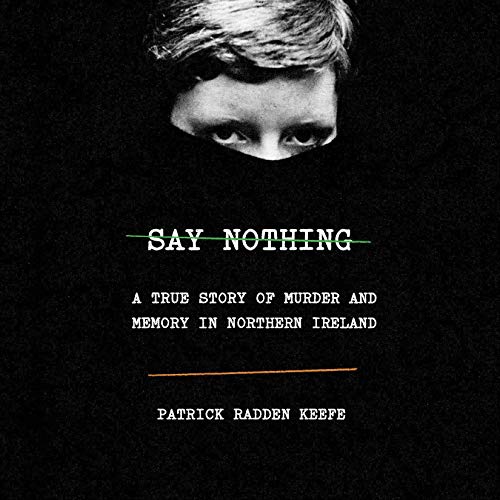 Say Nothing: A True Story of Murder and Memory in Northern Ireland by Patrick Radden Keefe
Say Nothing: A True Story of Murder and Memory in Northern Ireland by Patrick Radden Keefe Narrator: Matthew Blaney
Published by Random House Audio on 2019
Format: Audio, Audiobook
Source: Audible
Buy on Amazon
Goodreads

From award-winning New Yorker staff writer Patrick Radden Keefe, a stunning, intricate narrative about a notorious killing in Northern Ireland and its devastating repercussions.
In December 1972, Jean McConville, a thirty-eight-year-old mother of ten, was dragged from her Belfast home by masked intruders, her children clinging to her legs. They never saw her again. Her abduction was one of the most notorious episodes of the vicious conflict known as The Troubles. Everyone in the neighborhood knew the I.R.A. was responsible. But in a climate of fear and paranoia, no one would speak of it. In 2003, five years after an accord brought an uneasy peace to Northern Ireland, a set of human bones was discovered on a beach. McConville’s children knew it was their mother when they were told a blue safety pin was attached to the dress–with so many kids, she had always kept it handy for diapers or ripped clothes.
Patrick Radden Keefe’s mesmerizing book on the bitter conflict in Northern Ireland and its aftermath uses the McConville case as a starting point for the tale of a society wracked by a violent guerrilla war, a war whose consequences have never been reckoned with. The brutal violence seared not only people like the McConville children, but also I.R.A. members embittered by a peace that fell far short of the goal of a united Ireland, and left them wondering whether the killings they committed were not justified acts of war, but simple murders. From radical and impetuous I.R.A. terrorists such as Dolours Price, who, when she was barely out of her teens, was already planting bombs in London and targeting informers for execution, to the ferocious I.R.A. mastermind known as The Dark, to the spy games and dirty schemes of the British Army, to Gerry Adams, who negotiated the peace but betrayed his hardcore comrades by denying his I.R.A. past. Say Nothing conjures a world of passion, betrayal, vengeance, and anguish.
I read this book on the recommendation of an English teacher friend, Carol Jago. She is one of the most voracious and widely-read people I know, and she has never recommended a book that wasn’t brilliant. This book is no exception. If you are like me and do not know much about The Troubles, this book is a great introduction that will leave you wanting to know more. I know, for example, that I want to read Ed Moloney’s book Voices from the Grave: Two Men’s War in Ireland. If I’m being honest, even though I understand why Ireland was partitioned, it doesn’t make a lot of sense to me that the island is still divided, and I have a feeling it won’t be for too many more years.
I first remember hearing anything about The Troubles as a child, when the Irish Republican prisoners’ hunger strike in the early 1980s was in the news. I remember being really confused by the whole thing. Further, I remember feeling horrified that it was happening. The Troubles were mostly out of the new in the U.S., however. It was easy to know nothing about what was happening in Northern Ireland. Every once in a while, a story about some action or other by the I.R.A. would show up on the news. An episode of Star Trek: The Next Generation called “The High Ground” centered on the struggles of the Ansata rebels against the Rutians—it was a very thinly veiled allusion to The Troubles. The Ansata rebel leader’s name was even Kyril Finn. Finn is not only a common surname in Ireland, but it’s also potentially a reference to Fionn mac Cumhaill, a mythological figure in Ireland and the inspiration for the Fenian Brotherhood, a precursor to the I.R.A. Commander Data makes a reference to terrorism effectively achieving the reunification of Ireland in 2024. The episode aired in 1990. At that time, it seemed unlikely, but Brexit will change the border between Northern Ireland and the Republic—as Keefe wonders in his book’s conclusion, I can’t help but speculate if, after years of bloodshed, it will be the politics of Brexit that finally prompt the reunification of Ireland on the same timeline, more or less, as Star Trek predicted. The idea is so incendiary that RTÉ has never aired the episode, and it only aired on the BBC in 2007.
Sinn Fein politician Gerry Adams does not come off well, and his repeated insistence that he was never in the I.R.A. strikes me as a bald-faced lie. The Price sisters, Dolours and Marian, are written in their complexity: at the same time as you know they engaged in terrorist acts, and you want to condemn them, they also come off as, well, kind of badass, and you want to admire them for that. I mean no disrespect to their victims in saying so. The descriptions of their force-feeding during their hunger strike are harrowing, and Keefe makes a fairly good case for the lifelong aftereffects seriously impacting the sisters’ health. Above all, Jean McConville emerges as a poignant victim. Whether or not she was a “tout,” as the I.R.A. claimed, she can’t have been providing much useful information, and if she was spying for the British, one can hardly blame her for trying to take care of her ten children, whose lives were irrevocably destroyed by their mother’s murder.
My husband and I listened to this on audio together. Matthew Blaney is an actor from Northern Ireland, and I have to say, it’s something else to hear this story narrated by someone who sounds like the people Keefe is writing about. I would definitely listen to Matthew Blaney read again, even if I have to put up with Steve mimicking an Irish accent into the bargain. His reading is an interpretation of the text—where he emphasizes, the listener learns to pay attention. As much as I recommend the audio, I know I missed some details (as well as the Notes), so I downloaded the book on Kindle for a re-read when I get the chance.
Definitely one of the top nonfiction books I’ve read in some time. It’s gripping, and it is told almost like a mystery novel (especially if you don’t know as much about The Troubles). The book’s final revelations will leave your head spinning.
I made a Spotify playlist about music inspired by The Troubles.
 The Restaurant at the End of the Universe (Hitchhiker's Guide, #2) by
The Restaurant at the End of the Universe (Hitchhiker's Guide, #2) by 